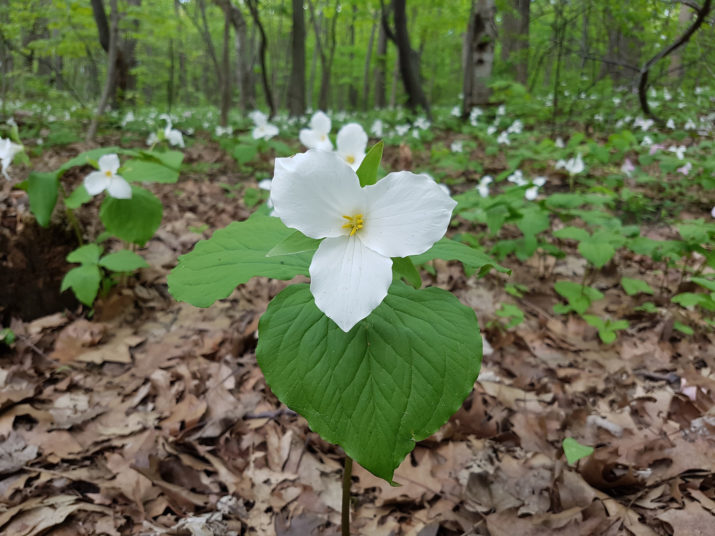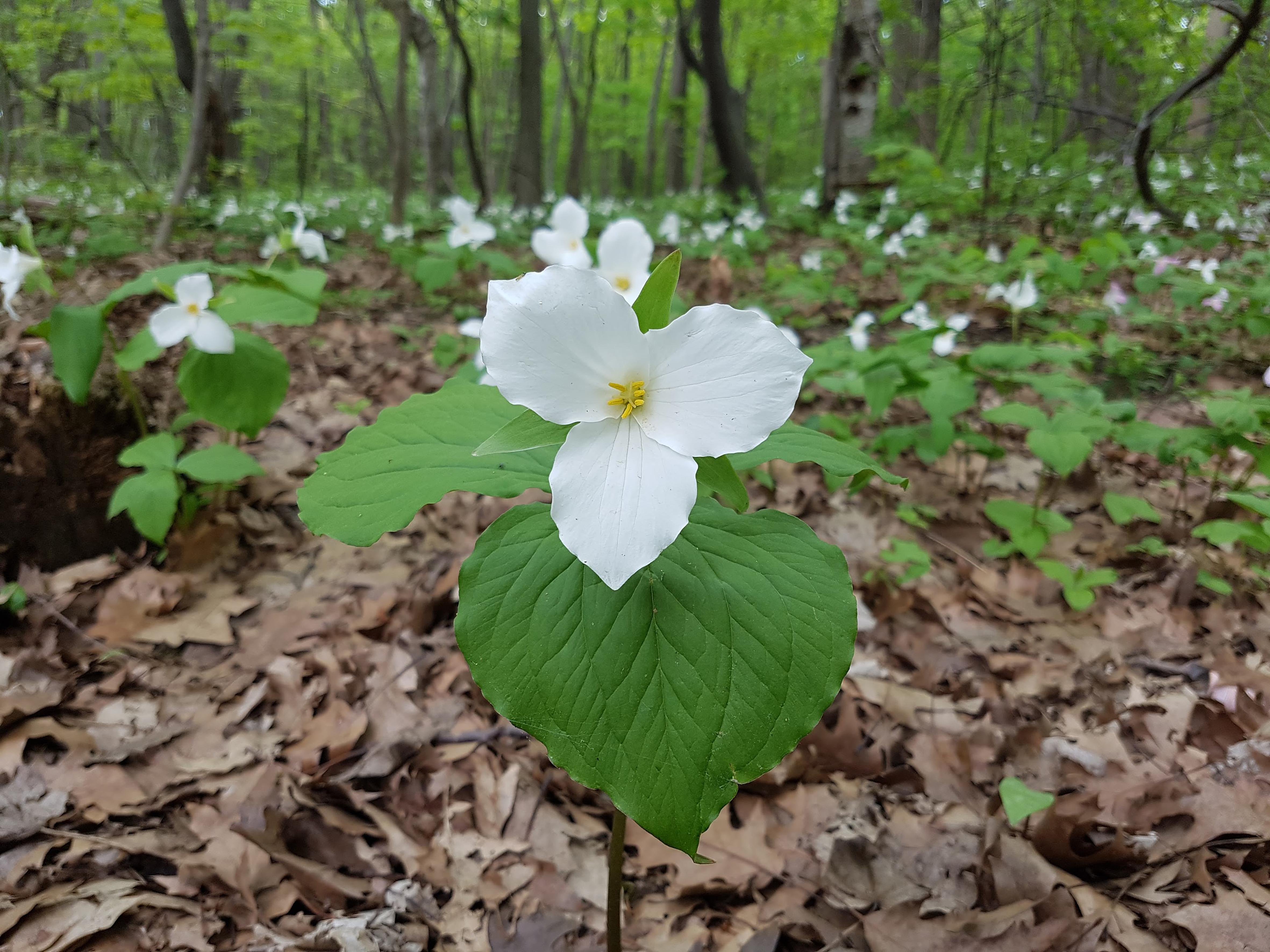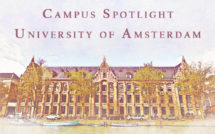
Building Sustainability Through Collaboration: The Trillium Inter-institutional Workshop on Teaching Sustainability

A trillium is a beautiful three-leaved wildflower. The Trillium Workshop uses this plant as its symbol of cultivating a culture of sustainability through teaching. Inspired by the three-leaved plant, the Trillium conference uses a tripartite approach to sustainability that includes social, economic, and environmental elements. The Trillium Workshop is an annual, multi-institutional, and multidisciplinary academic network based in the Piedmont of central North Carolina (USA). It has convened annually since 2010, hosted by multiple universities in the region: Duke University, North Carolina State University, and the University of North Carolina. Within these institutions, the North Carolina State University Arboretum, the Duke Campus Farm, and the Duke Gardens specifically have been valuable sites in support of the workshop. The Workshop grew out of valuable models in other places and organizations. It has succeeded in developing networks that advance local environments as it addresses the environmental, economic, and social aspects of sustainability to promote justice. Each year, the workshop incorporates an array of teaching techniques, such as participatory and place-based learning.
It is at Duke’s Nicholas School of the Environment that the Trillium Workshop was initially conceived and created in 2010. It aimed at connecting campus leaders and providing them with resources for increasing sustainability leadership in higher education. The Workshop builds on a long history of environmental education and sustainability leadership at Duke and on the collaborative environment within the North Carolina Research Triangle between local universities –private and public- and the University of North Carolina system as a whole. The original impetus for the workshop was provided by similar programs at other institutions―for example the Northern Arizona University’s Ponderosa Project (Rowland and Chase 2004) and the Piedmont Project at Emory (Barlett and Rappaport 2009).
The workshop is a model for innovative work that promotes sustainability across many institutions. Each year, the Trillium Workshop relies on participatory and experiential learning strategies to promote the concepts and values of the organization while building a community of sustainability fellows who can promote tools and approaches within their own organizational network. Over time, a wide network has developed in the region that reaches beyond traditional academia. This piece spotlights the characteristics of the Trillium Workshop that may be of interest to other teaching institutions. The multidimensional definition of sustainability presents the pathways and possibilities of improved practices as it addresses economic, social, and environmental needs in our institutions and communities.
The tenth annual Trillium Workshop was hosted in May 2019 at North Carolina Central University (NCCU) ―a Historically Black University located in Durham, North Carolina (USA), and a category also known as a Minority Serving Institution (MSI). The 2019 workshop theme explored the role of justice in reaching sustainability goals. During the Workshop, we investigated the tripartite definition of sustainability in relation to justice and described a multidisciplinary and hands-on approach to advance the teaching of sustainability. Some of the workshop activities are described here and situated in the context of the network. We conclude with some lessons that may be applied to advance sustainability in other places and institutions, particularly those with a teaching focus.
Background: Defining and Teaching Sustainability
Sustainability not only addresses an environmental capacity, but also economic and social elements. The three aspects of sustainability can be expressed as a Venn diagram, showing how the three domains intersect to achieve sustainability (Moir and Carter 2012). The Workshop further developed this conception by suggesting the notion of “nestedness” (Figure 1) to represent the inextricable relationship and foundation of the environment with the economy and society (Cagle 2016).


Figure 1: Venn Diagram vs. Nestedness
While an environmental curriculum may address sustainability directly, it is the philosophy of the Trillium Workshop that sustainability can and should be integrated across curricula and institutions. Thus, a substantial focus of the workshop has been to involve educators from all domains and disciplines, who are interested in integrating sustainability into their programs of instruction.
In relation to the theme of the 2019 workshop, “Justice and Sustainability,” the participants were reminded that sustainability represents “the need to ensure a better quality of life for all, now and into the future, in a just and equitable manner, whilst ‘living within the limits of supporting ecosystems’” (Agyeman 2003). Environmental justice is the realm of both essential activism and important formal scholarship that is central to any conception of sustainability and justice. Environmental justice and fighting environmental racism have strong roots in North Carolina. As a prominent example, it is in North Carolina that people protested against toxic landfills in Warren County (United Church of Christ 1987). The Workshop highlighted the exclusionary nature of our common definitions and actions of sustainability, and how actions for “sustainability” at best ignore environmental racism, or at worst perpetuate it.
In doing so, it allowed participants to explore the conditions of minority communities who are excluded from municipal services and motivated the understanding that questions of environmental, economic, and social sustainability are truly pressing issues of our time that must be addressed with urgency at the local level. A variety of sessions focused on skills such as active collaborative teaching tools, while also addressing accessibility in the path to sustainability.
Another goal of Trillium has been to focus on campus features and programs that support teaching sustainability. The NCCU Campus Garden has been used in a variety of courses, for example for its composting facility and pollinator garden. Over the years, an important component of the Trillium Workshop has been a field trip: an opportunity to get outside for an environment-related event. This year, the field trip was to the American Tobacco Trail, a “Rails to Trails” component of the East Coast Greenway, a bike and pedestrian route running from Florida to Canada. This impressive local component of a national greenway is not well-known despite being adjacent to campus. The opportunity to walk to it underscored the value of place-based teaching and local sustainability resources.
Lessons Learned: Inter- and Intra-institutional Relationships
The foundation of the Trillium Workshop―like an ecosystem―is the connectedness of inter- and intra-institutional collaboration through interdisciplinary approaches. While it is common for large and private universities such as Duke to have enough resources for sizable sustainability programs that allow them to hire coordinators, build LEED platinum certified building, and provide employee incentives, the vast majority of schools do not have this formal capacity. Yet, it is arguably the lesser-resourced institutions that could specifically benefit from improved sustainability. Indeed, the language of sustainability is invoked with regards to the survival of HBCU institutions as a whole (Andrews et al. 2016). The importance of supporting African Americans and other minorities in the sciences (particularly in environmental science), especially through HBCUs and MSIs, was at some point a priority of a Federal Department of Energy Program: “The Historically Black Colleges and Universities/Minority Institutions Environmental Technology Consortium” (Chase 2004). Hosting the workshop at NCCU gave both an opportunity for NCCU to focus on its sustainability efforts, as well as connect other institutions to the resources and programs at NCCU.
Christopher Paul is an Assistant Professor of Public Administration at North Carolina Central University and completed his Ph.D. in Environmental Policy from Duke University.
Tirupapuliyar Damodaran is an Assistant Research Professor of biology at North Carolina Central University. After completing a PhD in genetics at the University of Madras, he engaged in post doctoral training in environmental toxicology and medical genetics at Duke university.
Noelle Wyman Roth is an Associate in Research at Duke University’s Nicholas School of the Environment and holds a Masters of Environmental Management from Duke University.
Laurell Malone is Director of the Office of Faculty Professional Development at North Carolina Central University and holds an Ed.D. from Virginia Tech.
Charlotte Clark is the founder of The Trillium Workshop and an Assistant Professor of the Practice of Sustainability at Duke University’s Nicholas School of the Environment.
References
Agyeman, Julian, Robert Doyle Bullard, and Bob Evans, eds. Just sustainabilities: Development in an unequal world. MIT press, 2003.
Andrews, Donald R., Sung No, Kimberly K. Powell, Melanie Powell Rey, and Ashagre Yigletu. “Historically Black Colleges and Universities’ institutional survival and sustainability: A view from the HBCU business deans’ perspective.” Journal of Black Studies 47, no. 2 (2016): 150-168.
Barlett, Peggy F., and Ann Rappaport. 2009. “Long-Term Impacts of Faculty Development Programs: The Experience of TELI and Piedmont.” College Teaching 57 (2): 10.
Cagle, Nicolette. “Sustainability & Dependency: Revamping a Graduate-level Forestry Course.” Duke University Trillium Sustainability Fellows Blog Post, 2016. https://sites.duke.edu/trillium/2016/10/06/sustainability-dependency-revamping-a-graduate-level-forestry-course/
Chase, Geoffrey W., and Paul Rowland. “The Ponderosa Project: Infusing sustainability in the curriculum.” Sustainability on campus: Stories and strategies for change (2004): 91-106.
Moir, Stuart, and Kate Carter. “Diagrammatic representations of sustainability–a review and synthesis.” In Procs 28th ARCOM (Association of Researchers in Construction Management) Conference, Edinburgh, UK. (pp. 1479–89), 3-5 September 2012.
Rowland, Paul, and Geoffrey W. Chase. 2004. “The Ponderosa Project: Infusing Sustainability in the Curriculum.” In Sustainability on Campus: Stories and Strategies for Change, edited by Peggy F. Barlett and Geoffery W. Chase. Boston, MA: MIT Press.
United Church of Christ. Commission for Racial Justice. Toxic wastes and race in the United States: A national report on the racial and socio-economic characteristics of communities with hazardous waste sites. 1987.
Photo: Forest with white flowers in blossom. White trillium, large-flowered trillium, great white trillium, white wake-robin
Published on January 16, 2020.




